Blogs
Practical Insights & Latest Happenings
Don’t miss out on the latest trends and info on SEO, search engines, social media, and more.
September 26, 2023
mothasim
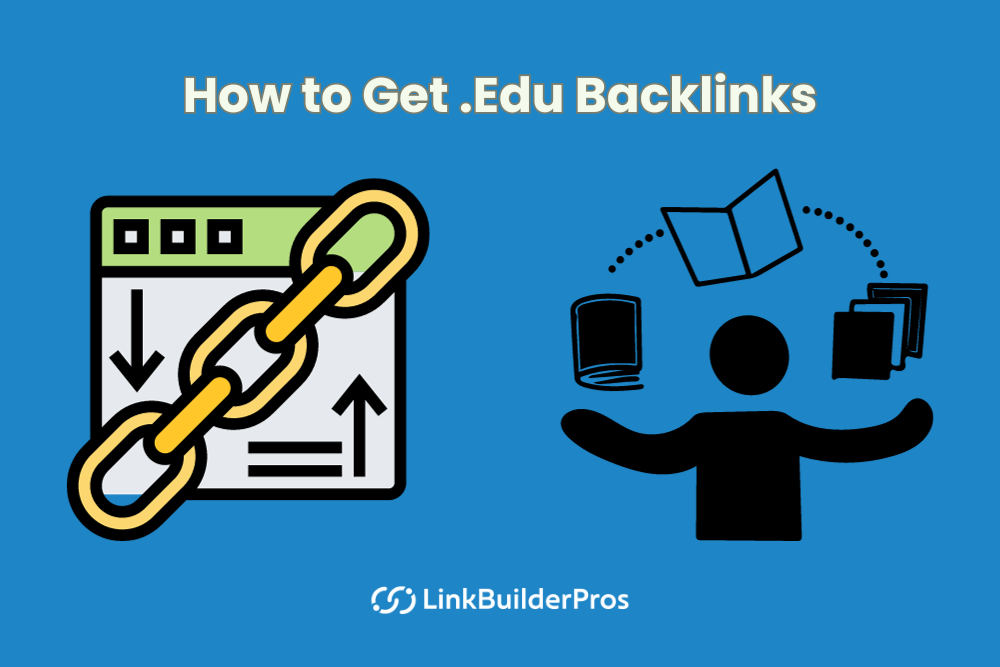
Getting .edu backlinks can give you a significant advantage over your competitors. However, obtaining them is not always a piece of cake.
That’s why many people resort to acquiring backlinks from unreliable and low-quality .edu websites. Unfortunately, these links can actually have a negative impact on your SEO instead of benefiting you.
Google frequently penalizes or even removes websites with suspicious backlinks. Penalized sites experience a significant decrease in traffic and visibility, but deindexed sites face an even worse fate. They are completely removed from Google’s search results forever.
To help you avoid such situations, we will explain how to get .edu backlinks the best ways that work like charm.
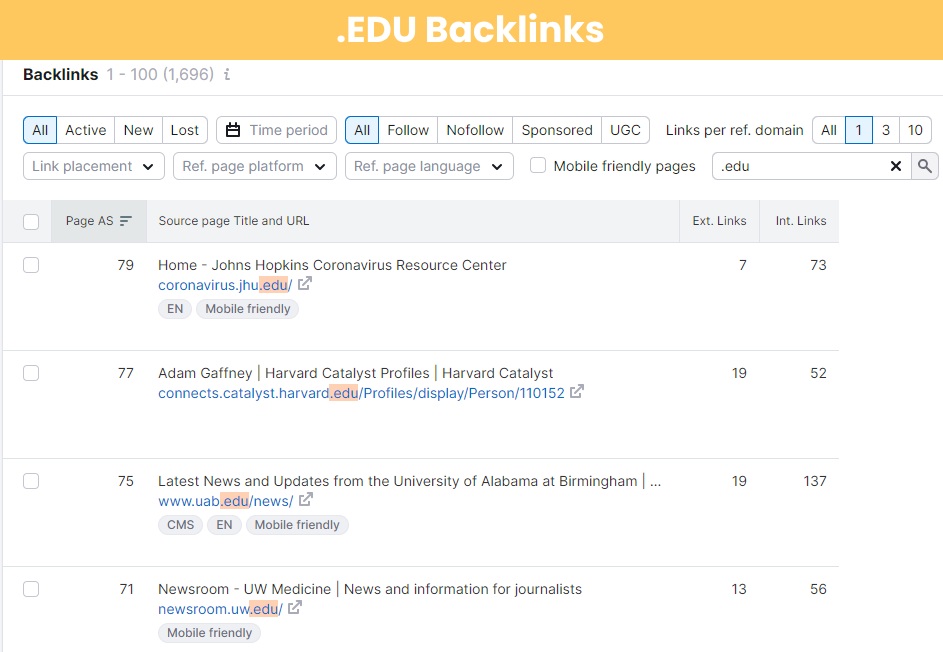
A .edu domain is a sponsored top-level domain (sTLD) used by post-secondary educational institutions in the United States. The .edu domain was originally created in 1985 and initially open to registration for entities from any region. But the domain was restricted in 2001 to US–affiliated institutions of higher education.
There are currently over 4,000 institutions with .edu domains. Some of the most well-known are Harvard University (harvard.edu), Stanford University (stanford.edu), and the Massachusetts Institute of Technology (mit.edu).
The .edu domain is overseen by EDUCAUSE – a nonprofit organization that supports the use of information technology in higher education. Educause has specific criteria and policies in place to ensure that only eligible educational institutions can register and use .edu domains.
To be eligible for a .edu domain, an institution must be accredited by a Department of Education-recognized accreditor and must offer at least a four-year degree program. The institution must also be a member of EDUCAUSE, the organization that manages the .edu domain.
.edu domains are often used by search engines to rank websites higher in search results. This is because .edu domains are seen as being more authoritative and trustworthy than other types of domains.
Just like .gov sites, links from .edu sites are valuable because they carry trust and authority. Here are the reasons you should always incorporate these types of backlinks into your backlink profile.
edu websites have a strong reputation and are considered trustworthy by search engines like Google. In the past, people would try to cheat the system by getting links from low-quality and spammy websites to boost their rankings. However, search engines quickly caught on to this trick.
Nowadays, those spammy links don’t really help websites rank higher. In fact, they can actually harm the websites they’re linked to. That’s why it’s important to focus on getting backlinks from reputable and authoritative websites.
Most .edu websites have a high level of domain authority, which means they carry a lot of weight in terms of credibility. You can check the domain authority of these sites using tools like Moz Link Explorer.
Here is how to do it:
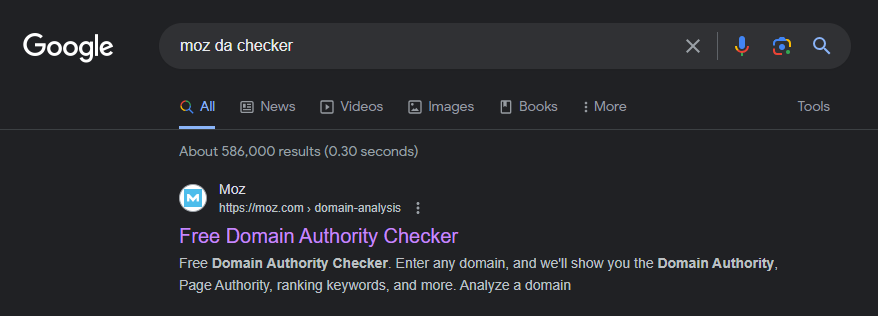
Step 1: Google MOZ DA Checker and visit the website.
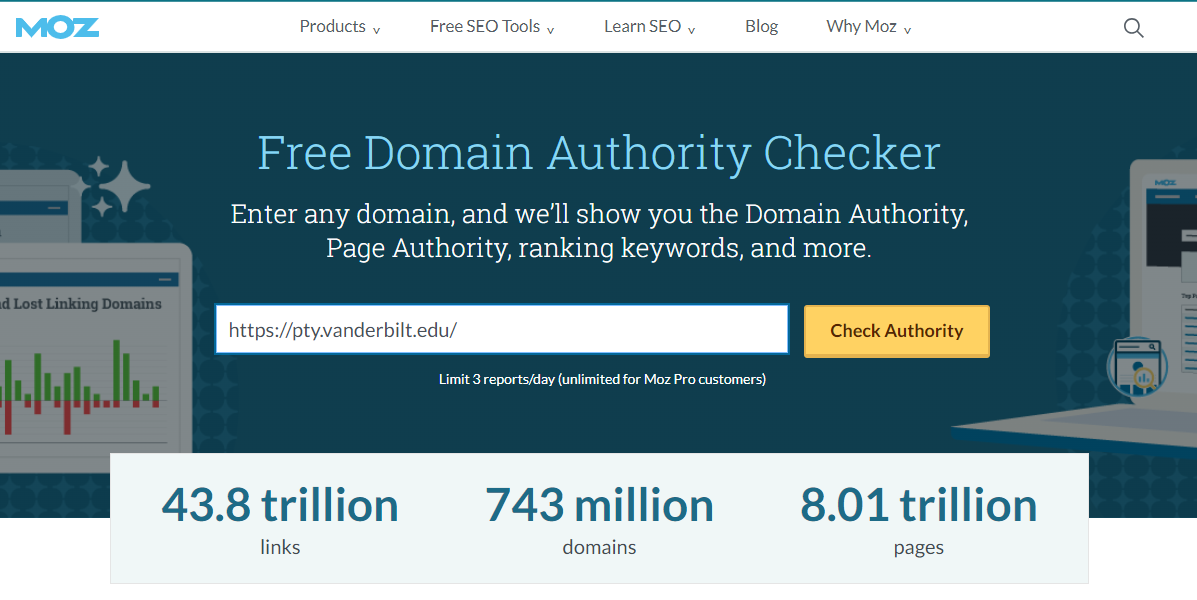
Step 2: Type in the edu website’s URL that you want to check the authority of.
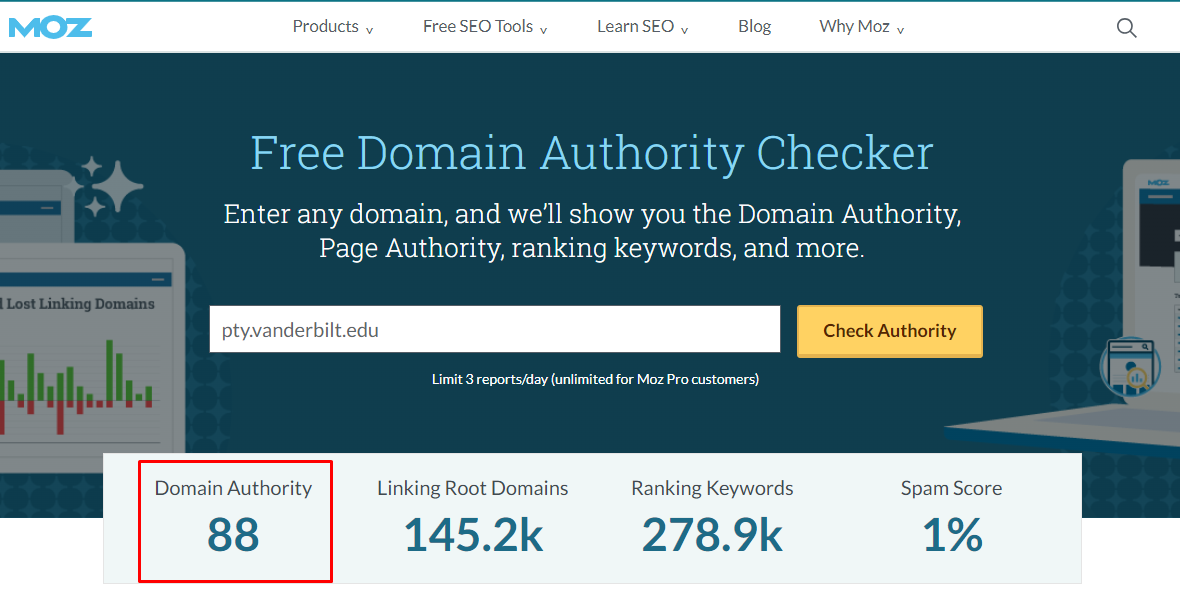
Step 3: The DA will be shown immediately by the tool.
Just think about how many websites you know that end with .com. I’m sure it’s a lot, right? That’s because anyone can easily get a .com website.
Now, let’s consider how many websites you know that end with .edu. Probably not as many, and there’s a good reason for that.
You see, not everyone can get a .edu website. In fact, only U.S.-based postsecondary institutions are allowed to register domain names ending with .edu. That’s why .edu domains are seen as more trustworthy compared to domains that are available to everyone.
In addition to that, most .edu websites publish high-quality content like research papers and reports. This further enhances their credibility and influence.
A general rule is that having more backlinks can improve your website’s ranking. However, it’s not entirely accurate. The number of links you have isn’t the only important factor. Quality matters a lot, if not more.
But how can you tell if a backlink is high-quality? Well, high-quality backlinks meet two criteria:
Luckily, most .edu websites have links that meet both of these criteria. And they often have a substantial number of them.
There are several reasons edu backlinks are trustworthy. The first one is .edu domains are only available to accredited educational institutions. Educational institutions typically have a vested interest in providing accurate and up-to-date information. This means that the content on their websites is likely to be reliable.
Also, educational institutions often have a large number of visitors. This means that links from these domains are more likely to be seen by potential customers or clients.
.edu websites can be selective when it comes to linking to other sites, making their links even more valuable. However, the downside is that obtaining .edu links is not an easy task for you either. It can take several months of experimentation and persistence just to secure a single .edu backlink.
It is almost impossible for link building agencies to build and maintain relationships with .edu website owners and buy edu backlinks from them because there are authorities that keep them in check. This means you won’t find any link building company that will offer you .edu backlinks with their package.
As mentioned above, .edu backlinks are usually difficult to get, which makes them more valuable in the eyes of Google. Here are the most effective ways we use to build our backlink profile, and we believe these will work out for you too if you’re eager to know how to get edu and gov backlinks.
If you want to get some good educational backlinks, a great strategy is to focus on local connections. If you’re promoting a local business through your website, begin by reaching out to nearby schools and colleges. Look for websites that have sections like “Local Resources” or “Local Businesses” and ask them to include your website.
To make it even more relevant, see if you can find a specific local section on the website that relates to your company’s niche. For example, if you have a restaurant, look for a “Local Dining” section, or if you have a hotel, look for a “Local Accommodations” section. This way, you’ll be targeting an audience that is interested in what your business offers.

Many educational organizations have “resource pages,” which are similar to blog pages. However, there is a difference between them – Unlike most blogs that focus on a specific topic, educational resource pages cover various niches that interest staff, students, and partners.
If you discover an organization with a rich community that you can contribute valuable content to, you can propose a content to them. Here’s how to find such opportunities: Open Google and enter the following search query:
site:.edu + niche keyword + inurl:resource
You’ll get a list of .edu domains with resource pages and published content related to the specific niche keyword that you entered.
Take some time to browse through their previous posts to get an idea of the type of content that they prefer. Once you have a good understanding, find the website owner’s email address and send them your content proposal.
Offering discounts to faculty and staff members of specific universities is a good way to get backlinks from educational websites. However, it’s important to note that Google doesn’t like it when you pay for links, so don’t exchange discounts for links directly.
Instead, reach out to the person in charge of discounts at the university (usually someone in the Human Resources Department) and let them know that their faculty and staff members are eligible for a discount at your business. They will likely be happy to link to your website because it makes it easier for their employees to access the discount.
If you have a local business, focus on contacting local colleges. If you have an e-commerce website, you can decide how many schools you want to include for the discount.
This involves investing some money in exchange for getting .edu links from well-known educational institutions.
You don’t have to offer a huge scholarship. Even a modest $500 scholarship annually will do. Many educational institutions are willing to accept scholarships from 3rd-party or private sources for their students.
You don’t have to give away your money all at once. Instead, you can choose to offer this scholarship two or three times a year to one who really deserves it.
This way, you have the opportunity to grant your scholarship to a good student in exchange for a valuable .edu link that might benefit you for a long time. To make this plan effective, you need to locate institutions that have a dedicated page for scholarships.

Another great way to naturally get a valuable backlink to your website is by interviewing a well-known person who works at a university. This is like baiting their ego because the university will probably want to show off how talented their employee is by linking to the interview.
If you put the interview on your website, you can get a backlink from the university. Remember to choose someone relevant to your website’s topic. For instance, try to find a professor who teaches subjects that are closely related to your niche.
This method can help you secure several backlinks from educational websites if done well. The idea is to offer internship and/or job positions to students, and in return, you’ll be listed on their career page.
Universities and colleges are always seeking job openings for their students. Finding institutions to collaborate with is pretty easy since they usually have career pages. Remember that you should also have some job openings or internships available in your agency.
To make it more targeted, you can focus on candidates with specific expertise. You’ll still receive several backlinks from educational websites using this approach.
How to go about it? Start by creating a career page on your website. Include details like the available internships or job positions and the qualifications you’re seeking in the potential candidate.
In the next phase, get in touch with these institutions and inform them about the career opportunities you have for their students.
Let them know that you’re open to having the information that’s posted on their platform and also provide your link for it.
Also called the 404 link building or dead link building technique, this strategy allows you to discover the broken links (hyperlinks pointing to a website that doesn’t exist anymore) on a website and add them to your backlink profile.
First look for broken links on educational domains (websites ending in .edu). Contact the website administrators (webmasters) and request them to replace the broken links with links to your own relevant content.
We recommend that you use a reliable SEO tool to identify the broken links on a large scale. For instance, Ahrefs site explorer is a highly recommended option for this purpose. Use its Open Site Explorer feature to scan any .edu domain you prefer and look for 404 links.
When you have found some broken links, check to see what kind of content that they were originally linking to. You can use the Wayback Machine. Then focus on creating quality and informative content that might work as a suitable replacement for those broken links.
Reach out to the webmaster of the website that contains the broken links. Inform them about the broken links and then offer your blog or article as a replacement.
Although getting links from highly authoritative sources is a must to build a robust backlink profile, the process is not that simple. Here we shared some of the best ways on how to get .edu links for free to help enrich your backlink profile. Try them and let us know which methods worked for you.